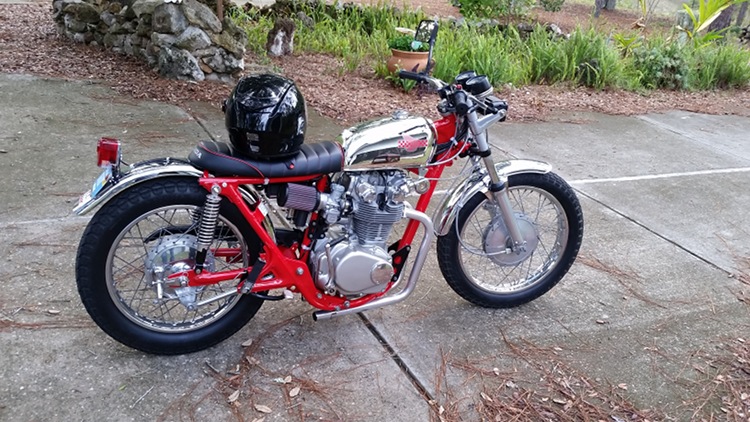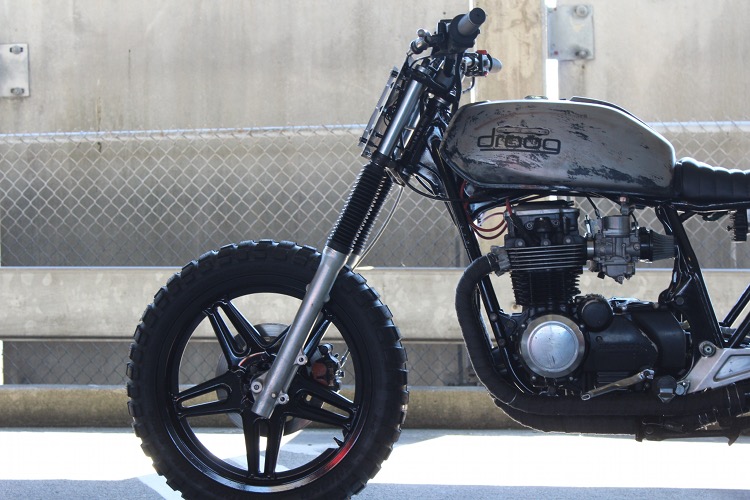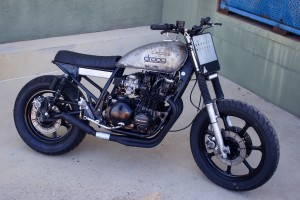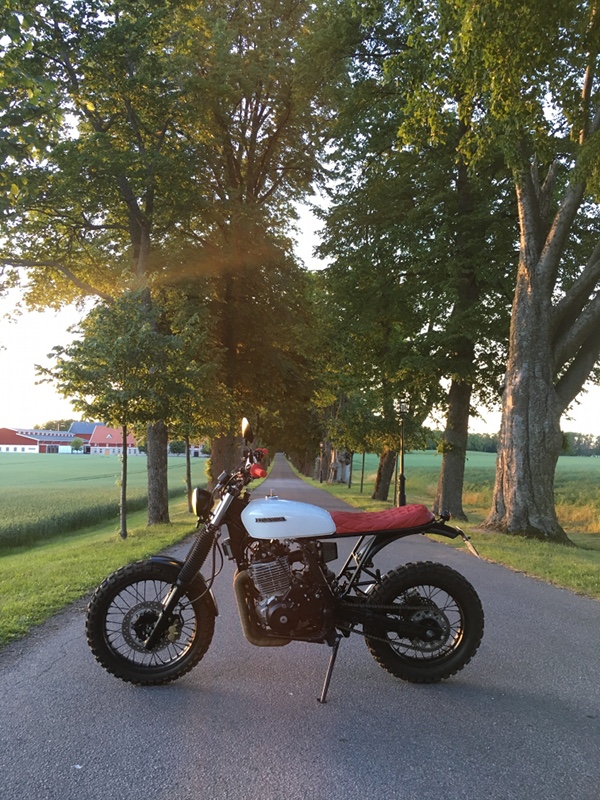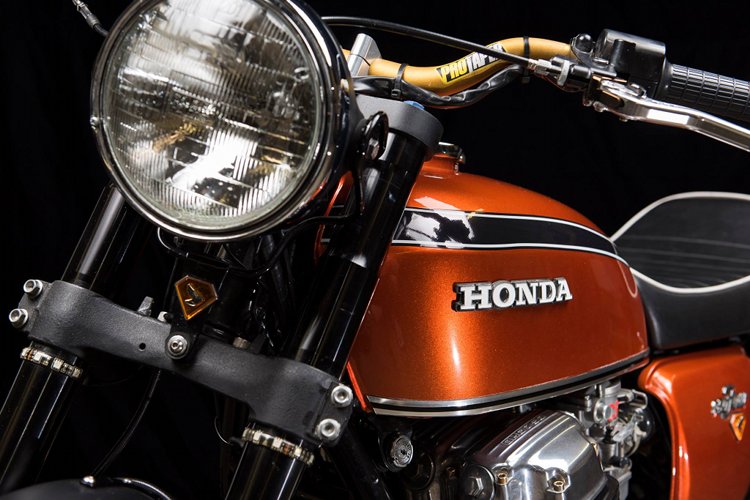What if there had been a postwar cafe racer culture that originated in Japan instead of the UK?
This was the question that builder Scott Wilson asked himself. Scott, a fan of Quentin Tarantino’s films, decided to create a bike inspired by the legendary samurai sword-maker Hattori Hanzo, as portrayed in Kill Bill. The result is “Shinobi” — the Japanese word for male ninja — a 1974 Honda CB450 cafe racer that might well have sprung from a parallel universe in which cafe racer culture evolved in the islands of Japan instead of England.
This bike is brighter, cleaner, and more stylized than so many of the blacked-out cafes we see. The bike looks like the work of a large professional shop, but Scott actually assembled the bike in his apartment, taking care to acknowledge all of the men and companies who helped him along the way.
We think Hanzo would be proud.
Honda CB450 Cafe Racer: Builder Interview
(Words by Scott Wilson. Highlights by us.)
Please tell us a bit about yourself, your history with motorcycles, and your workshop.
I grew up in the country, the recession in the 80’s hit us hard so we made do with what we had. Me and my pops would stay up til 2am fixing old sleds we’d found in the scrap yard, retrofitting and making things work. I cut my teeth on Sachs engines and Mikuni carbs. My first bike was a Can-Am 175, which I rebuilt and then promptly ran into the ground. I’ve relied on workspace in various bodyshops I’ve worked at over the years with, and at times overstayed my welcome. When I need a tool I buy it, then sell it cheap when I’ve worn it out. Robb Hoefling, an instructor at SAIT and good friend, was gracious enough to let me use his facilities in Langdon to lay down the colours. I assembled the bike in my apartment.
My first bike was a CB360, given to me by a close friend. I slowly rebuilt it, and was coerced to go the cafe route by my uncle, a bike fan whom I’d witnessed as a child tearing up and down the road on his KZ1000. I shaved all evidence of Honda emblems from it and won best bike in a rained-out ratrod show that year. You should have heard the groans when the other builders heard it was a Honda. But I had a cafe in a sea of choppers, it stood out.
What’s the make, model, and year of the bike?
“Shinobi” is a ‘74 Honda CB450K7 DOHC
Why was this bike built?
This was purely personal. I knew I wanted to build something special, and before I’d even found it I had ideas in my head about a theme. I’ve built some other bikes including a XS650 hardtail ratrod build, and city bomber CB360 Cafe. I was 3⁄4 of the way through the Shinobi build when I sold the XS to support and fund the final push.
What was the design concept and what influenced the build?
I’m a Tarantino fan, and I’m especially fond of Hattori Hanzo, as portrayed in Kill Bill. His ideology to swear off making swords was the spark, so I created a scenario where O-Ren Ishii commissioned Hanzo to build a sword, but on arriving to collect said sword, he explained it wasn’t possible. Instead, he had built and presented her with a Honda CB450K. The colour palette is actually stolen from a “Superdry” t-shirt haha, the wheels are reminiscent of boardtracker and salt flat racers, and as a whole, I imagined what cafe bikes would have looked like had the culture begun in Japan instead of the UK.
I’m a little leery of so many blacked out cafes. With this build I’m hoping to inspire more experimentation with brighter colours. In the animated portion of Kill Bill that recounts O-Ren’s rise to power as a sniper, I like to imagine her utilizing this bike to make her escapes. I’ve always kept close in mind an article that Bikeexif posted some time ago about the lines of a bike: http://www.bikeexif.com/build-cafe-racer. These lines are important to me and guided many of the lines I chose.
What custom work was done to the bike?
From the front, I have a set of GS750 hubs laced to 21″ motocross rims on Avon white walls, with GS1100 floating discs. The stock CB450 bottom triple and Cognito Moto upper triple hold CB650 forks that have been internally lowered by 3”. The CB160 tank has been torched and stretched inside to make clearance for the CB450 backbone, and has been painted with heat sensitive paint, allowing the “Okinawa” and “Hattori Hanzo” kanji lettering to shift from red to black in the sun.
Mated to that is an IKEA chair cut down for the seat pan, upholstered locally by Degreeves Upholstery, snuggled in fore the Ducati replica tail fairing which houses the brain, an AGM battery and a MotoGadget M-Unit, controlled via an M-button in the Norman Hyde bars, which house a 6 function 4 button MotoGadget setup, and inverted brake and clutch levers with cables run internally.
Below all that is a Pamco Hall effect ignition and high output coils, electronic advancer, and VM32 Mikunis with velocity stacks. Between the Mikunis sits the reservoir for both the front and rear master cylinders. The rear end is a homemade 4″ stretch boxed Dresden style swingarm, with a handmade stayless caliper bracket, and a custom aluminum sprocket from Rebel Gears. The rearsets came from of Fast From the Past.
The engine was a very abused and trashed Saskatchewan motor, taken care of Extreme Engine Development, Luis Mackow of “ITune Subies” and Jim Siemens in Salmon Arm of ICS Ltd. Luis punched out the decrepit cylinders +1mm to make room for new Wiseco pistons, and reconditioned the heads with stainless valves and bronze guides from THR Racing. He also installed inserts into the plug holes to guarantee no more aluminum/steel corrosion from the spark plugs. Jim Siemens took the shady cams and made masters, then reground and re-hardened the cams back to spec, all on a tight schedule. Reassembling the engine with 600$ of followers from CMSNL.
I decided a short baffled street sweeper style exhaust would suit the “Shinobi” build. After welding and metal finishing, I had them sent to Alberta Plating to chrome. The headlight is housed by a Hodaka headlight bucket, which is home to a Speedhut Satellite Speedometer, fully customized with the Hanzo lion, day and night lighting, and my choice of font, color, and supposed top speed. Signals are also from MotoGadget, discreetly screwed into the side of the headlight bucket and tail fairing. The lock is a MotoGadget RF tag. Rear shocks are Hagon stainless fully shrouded shocks.
I must give credit to Phil and Vladko at Old Motorcycle Shop here in Calgary, for their invaluable source and support of used parts to mock up various bits of this build, as well the advice as to how to solve certain problems I’ve encountered. Their history and knowledge has gone a long way into making this bike, they may not know how much…
How would you classify this bike?
This bike is a cafe. But there are aspects that cross genres, the bars are reminiscent of the boardtrackers, and the wheels, exhaust, and stance are inspired if boardtrackers and salt flat racers. Carpy’s cafe inspired my love for the Dresden boxed swingarm. As far as cafes go it’s a far cry from the cafes of postwar U.K., and is more a fantasy of a postwar cafe culture in Japan. Brighter, more stylized, and cleaner.
Was there anything done during this build that you are particularly proud of?
As a whole, the bike has shown itself more valuable than the sum of its parts. The internal throttle WITH the inverted levers is a feat I’m still tweaking and perfecting, though I’m very pleased with how every line seems to compliment the others. I am very much infatuated with Shinya Kimura’s philosophy:
“A bike should look beautiful on its own, but is not complete until it has a rider.”
I am confident to say that I have accomplished that. I can never comprehend the final form a bike will take, it takes its form as it comes together, and above any specific detail, this form is paramount.
Follow the Builder @krylon.kastle





























































































